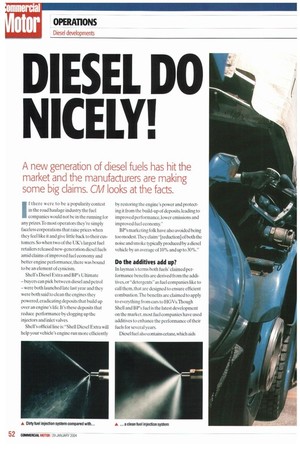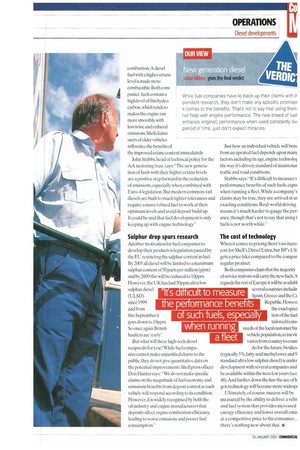DIESEL DO NICELY!
Page 52

Page 53

If you've noticed an error in this article please click here to report it so we can fix it.
A new generation of diesel fuels has hit the market and the manufacturers are making
some big claims. CM looks at the facts.
If there were to be a popularity contest in the road haulage industry the fuel companies would not be in the running for any prizes.To most operators they're simply faceless corporations that raise prices when they feel like it and give little back to their customers. So when two of the UK's largest fuel retailers released new-generation diesel fuels amid claims of improved fuel economy and better engine performance, there was bound to be an element of cynicism.
Shell's Diesel Extra and BP's Ultimate — buyers can pick between diesel and petrol — were both launched late last year and they were both said to clean the engines they powered,eradicating deposits that build up over an engine's life. It's these deposits that reduce performance by clogging up the injectors and inlet valves.
Shell's official line is: "Shell Diesel Extra will help your vehicle's engine run more efficiently by restoring the engine's power and protecting it from the build-up of deposits. leading to improved performance,lower emissions and improved fuel economy."
BP's marketing folk have also avoided being too modest.They claim "[reduction] of both the noise and smoke typically produced by a diesel vehicle by an average of 10% and up to 30%."
Do the additives add up?
In layman's terms both fuels' claimed performance benefits are derived from the addifives, ordetergents" as fuel companies like to call them, that are designed to ensure efficient combustionlhe benefits are claimed to apply to everything from cars to HGVs.Though Shell and BP's fuel is the latest development on the market.most fuel companies have used additives to enhance the performance of their fuels for several years.
Diesel fuel also contains cetane, which aids combustion.A diesel fuel with a higher cetane level is made more combustible. Both companies fuels contain a high level of this hydrocarbon,which tends to makes the engine run more smoothly with less noise and reduced emissions Shell claims users of older vehicles will notice the benefits of the improved cetane content immediately.
John Stubbs, head of technical policy for the AA motoring trust. says:"The new generation of fuels with their higher cetane levels are a positive step forward in the reduction of emissions, especially when combined with Euro-4 legislation. But modern common-rail diesels are built to much tighter tolerances and require a more refined fuel to work at their optimum levels and avoid deposit build up. It could be said that fuel development is only keeping up with engine technology"
Sulphur drop spurs research
Another motivation for fuel companies to develop their products is legislation passed by the EU restricting the sulphur content in fuel. By 2005 all diesel will be limited to a maximum sulphur content of 50 parts per million (ppm) and by 2009 this will be reduced to lOppm. However, the UK has had 50ppm ultra low sulphur diesel (ULSD) since 1999 and from this September it goes down to lOppm. So once again British hauliers are 'early'.
But what will these high-tech diesel recipes do for you? While fuel companies cannot make unjustified claims to the public, they do not give quantitative data on the potential improvements. Shell press officer Don Hunter says: "We do not make specific claims on the magnitude of fuel economy and emissions benefits from deposit control as each vehicle will respond according to its condition. However, it is widely recognised by both the oil industry and engine manufacturers that deposits affect engine combustion efficiency, leading to worse emissions and poorer fuel consumption." Just how an individual vehicle will bent from an uprated fuel depends upon many factors including its age, engine technoloE the way it's driven,standard of maintenar traffic and road conditions.
Stubbs says: "It's difficult to measure t performance benefits of such fuels, espec when running a fleet. While a company's claims may be true, they are arrived at ur exacting conditions. Real-world driving means it's much harder to gauge the pen! mice. though that's not to say that using t fuels is not worth while.
The cost of technology
When it comes to pricing there's no incre; cost for Shell's Diesel Extra, but BP's Ult gets a price hike compared to the compar regular product Both companies claim that the majority of service stations will carry the new fuel&A regards the rest of Europe it will be availabl several countries includir Spain.Greece and the Cz Republic.Howevc the exact sped tion of the fuel tailored to me4 needs of the local customer ba vehicle population,so inevit varies from country to counl As for the future, biodies1 (typically 5% fatty acid methyl ester and 9 standard ultra low sulphur diesel) is under development with several companies and be available within the next few years (see 48).And further down the line the use of h gen technology will become more widespi Ultimately, of course.success will be measured by the ability to deliver a vehi and fuel system that provides increased energy efficiency and lower overall emit at a competitive price to the consumer... there's nothing new about that. •
























































































































































































